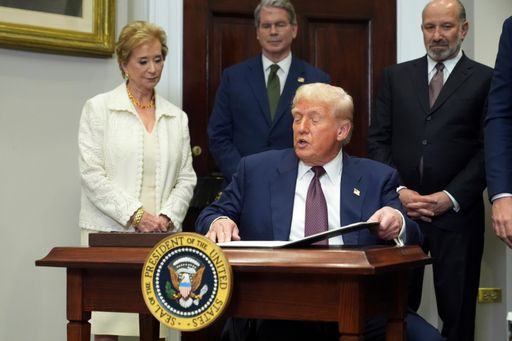Washington, DC — At 12:01 am [EST], the era of dirt-cheap imports flooding into the United States will hit a wall.
President Donald Trump's Executive Order 14324, which closes a loophole nearly a century old, has come into effect.
Packages valued under $800, once slipping through with little oversight, now face full US customs scrutiny and tariffs.
The e-commerce world is reeling. Temu, Shein, and billions of daily shipments are suddenly caught in a new regime.
For decades, the de minimis exemption was a quiet engine of global trade. Adopted in 1930 and expanded in 2016, it let billions of low-cost parcels enter the US with minimal checks.
In 2024 alone, 1.36 billion shipments flowed under its protection, mostly from China.
Temu and Shein thrived on it, selling $3 dresses, $15 gadgets, undercutting American retailers. Forever 21 closed its US stores in 2025, blaming these imports for lost customers.
Trump has framed the move as a fix for jobs and safety.
"Today, President Donald J. Trump signed an Executive Order suspending duty-free de minimis treatment for low-value shipments, closing the catastrophic loophole used to, among other things, evade tariffs and funnel deadly synthetic opioids as well as other unsafe or below-market products that harm American workers and businesses into the United States,” the White House said in July.
Statistics underline the urgency: 90 percent of Customs seizures last year came from de minimis packages. Narcotics, counterfeit goods, cheap knock-offs — they came mostly from China, generating $66 billion in duty-free sales in 2023 alone.

Change hits today
Every commercial package under $800 is now subject to tariffs: 54 percent or $100 for Chinese shipments, 10-50 percent for others.
For goods shipped through the international postal system, the duty ranges from $80 per item to $200 per item, depending on the tariff rate applicable to the country of origin of the product.
Reciprocal rates hit items like Brazilian beef at 76 percent. Small gifts under $100 and traveler allowances under $200 remain exempt.
Every shipment now demands full documentation, including product codes, and mistakes can cost up to $10,000.
Ports and airports could clog in the coming weeks and months. Postal services in Japan, the UK, and Australia have hinted at pausing US shipments, citing unpreparedness.
Who's feeling the pinch?
The bargains may vanish. Temu and Shein could raise prices —10-30 percent more. A $15 watch could cost $16.50–$19.50. Delivery times could possibly stretch.
According to US government data, about 73 percent of de minimis packages entering America originate from China.
Canada, Mexico and the United Kingdom are the next biggest senders, according to CBP figures. Other significant sources include India, South Korea, Thailand, and Vietnam.
Low-income families in the US are hedging their bets.
"I used to buy kids' clothes for pennies," says Sarah J, a single mother in Maryland told TRT World. "I don't have an idea what comes next."
Companies, too, are likely to scramble. Shein, for instance, is leaning on US warehouses in Illinois and California.
Temu is shifting 20-50 percent of stock to domestic fulfillment. Small Etsy and Depop sellers may pause sales in the short term.
Meanwhile, Amazon and Walmart see opportunity, targeting budget shoppers.
As per Reuters news agency, prices of merchandise at retail chains like Walmart and Target already reflect tariffs paid by the retailers when they import the goods, making them comparatively more expensive.
Supply chains wobble. As air cargo from Asia is already down 10.7 percent, ocean freight is expected to see a surge.
Tech startups like Maria Lopez's in Texas face soaring costs.
"Prototypes used to ship cheap and fast, now it's thousands in duties," she told TRT World.
Why now, and what's next
Trump accelerates a policy first hinted at in February 2025, citing trade deficits and fentanyl. China-specific cuts began in May.
The suspension, initially set for 2027 under the "One Big Beautiful Bill Act," was moved forward.
Critics warn of a $10-13 billion "tax" on consumers, but supporters hail stronger enforcement and aid to US manufacturers.
Customs now faces 4 million daily shipments with limited infrastructure. Legal challenges may delay full implementation until 2027.
Shoppers in the US would be nudged toward domestic goods as businesses brace for a new era of compliance.
"It's a bold move, but it's messy," says New York City trade analyst Laura Chen. "The US is reclaiming control, which is a good thing, but at a cost to wallets and wait times."



















